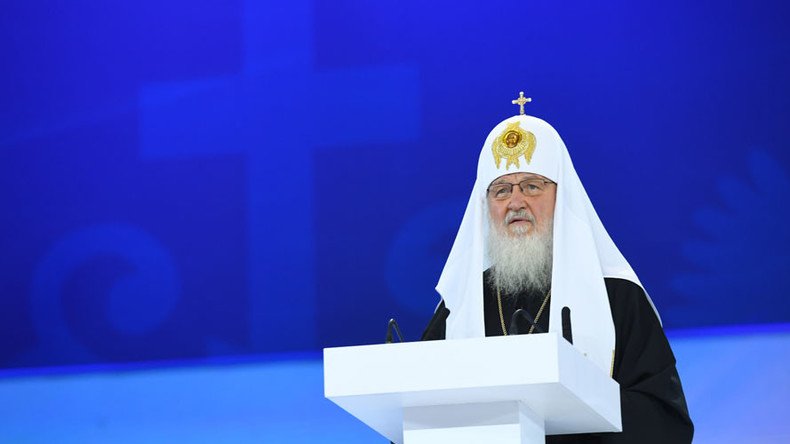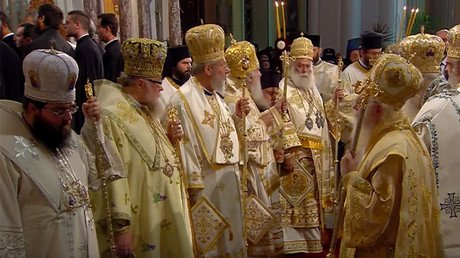Russian Patriarch’s UK visit to build trust between Russian & British believers

Patriarch Kirill’s three-day visit to the UK marks the 300th anniversary of the Russian Orthodox Church’s presence on the British Isles. The visit will last from October 15 to 18.
Over the course of the trip, the Patriarch will meet local representatives of the Orthodox Church, as well as Queen Elizabeth II at Buckingham Palace and Archbishop of Canterbury Justin Welby. In an interview with RIA Novosti, Church spokesman Metropolitan Ilarion said that he hoped the visit will help Russo-British relations.
“Relations between Russia and Britain in recent years are going through hard times,” Ilarion explained in the interview. “But history knows periods of cooperation between the two countries, for example during the Second World War. The past and the present encourage us to promote greater convergence of the peoples of Russia and Great Britain.”
“I believe that the pastoral visit of His Holiness Patriarch Kirill of Moscow and all Russia to the UK, joining with them in prayer, meeting with believers and representatives of the Church of England and the general public will help our peoples strengthen their mutual trust.”
Metropolitan Ilarion mentioned Prince Charles’ “genuine feelings” towards Orthodoxy.
“Only recently on the 30 September, Prince Charles, during his visit to Israel in connection with the funeral of former President Shimon Peres, paid a visit to the Russian convent in Gethsemane. He proceeded to the relics of the Grand Duchess Elizabeth Feodorovna, where he laid fresh flowers from his grandmother’s homeland. Then the distinguished guest left candles at other holy shrines.”
It is the first visit of the Patriarch to the UK in his current role. He visited back in 2006 as the Archbishop of Smolensk and Kaliningrad, when he arrived to celebrate the 50th anniversary of the Cathedral of the Sourozh Diocese of the Russian Orthodox Church in London.
During his visit, the Patriarch will consecrate the Cathedral of the Dormition of the Mother of God in London, which has been undergoing a major refurbishment.
Relations between Russia and the UK have soured recently, following the crises in Ukraine and Syria, but being part of the church is what brings people together, breaching political differences, Archbishop Elisey of the local Sourozh Diocese told RT.
“To say that on entering the temple we forget about politics is true, yes,” Elisey said. “But that doesn’t mean that politics is this bad thing that laymen shouldn’t get involved in, and indeed many do. And indeed many find themselves in serious discussions, including the Russian-speaking people. But all sorts of people come in and leave all their political differences outside. Here they find something deeper, more interesting – eternal life!”
The Russian Orthodox Church has had a presence in Great Britain since 1716, when the Russian Embassy Church was set up on the orders of Tsar Peter the Great. In October 1962, the Moscow Patriarchate’s Diocese of Sourozh was founded, which is the Russian Orthodox Church’s official (and largest) branch inside Great Britain and Ireland.
A smaller group of followers also belong to the Russian Orthodox Church Outside Russia (RCOR), which formed as a response to Bolshevik persecution of Christianity. On Saturday, the Patriarch will hold a service at the Cathedral of the Dormition in Chiswick belonging to the RCOR as a gesture of reconciliation.













